Exploring the Role and Responsibilities of a Company Auditor
VerifiedAdded on 2022/11/15
|7
|2260
|35
Essay
AI Summary
This essay provides a comprehensive analysis of the role, functions, powers, and duties of a company auditor, particularly focusing on the auditor's duty of care, its limitations, and the liabilities owed towards the company and shareholders under Singaporean statutory and common law. It references key cases such as Caparo Industries Plc vs Dickman and Spandeck Engineering (S) Pte Ltd v Defence Science & Technology Agency to illustrate the auditor's responsibilities and the extent of their duty of care. Furthermore, the essay explores the implications of corporate governance debates on the roles and duties of auditors and the formation of audit committees, emphasizing the importance of sound corporate governance in preventing fraud and protecting stakeholders' interests. The discussion highlights the enhanced role of audit committees and internal audit functions in the wake of corporate scandals, emphasizing the need for vigilance and adherence to ethical principles in the auditing process.
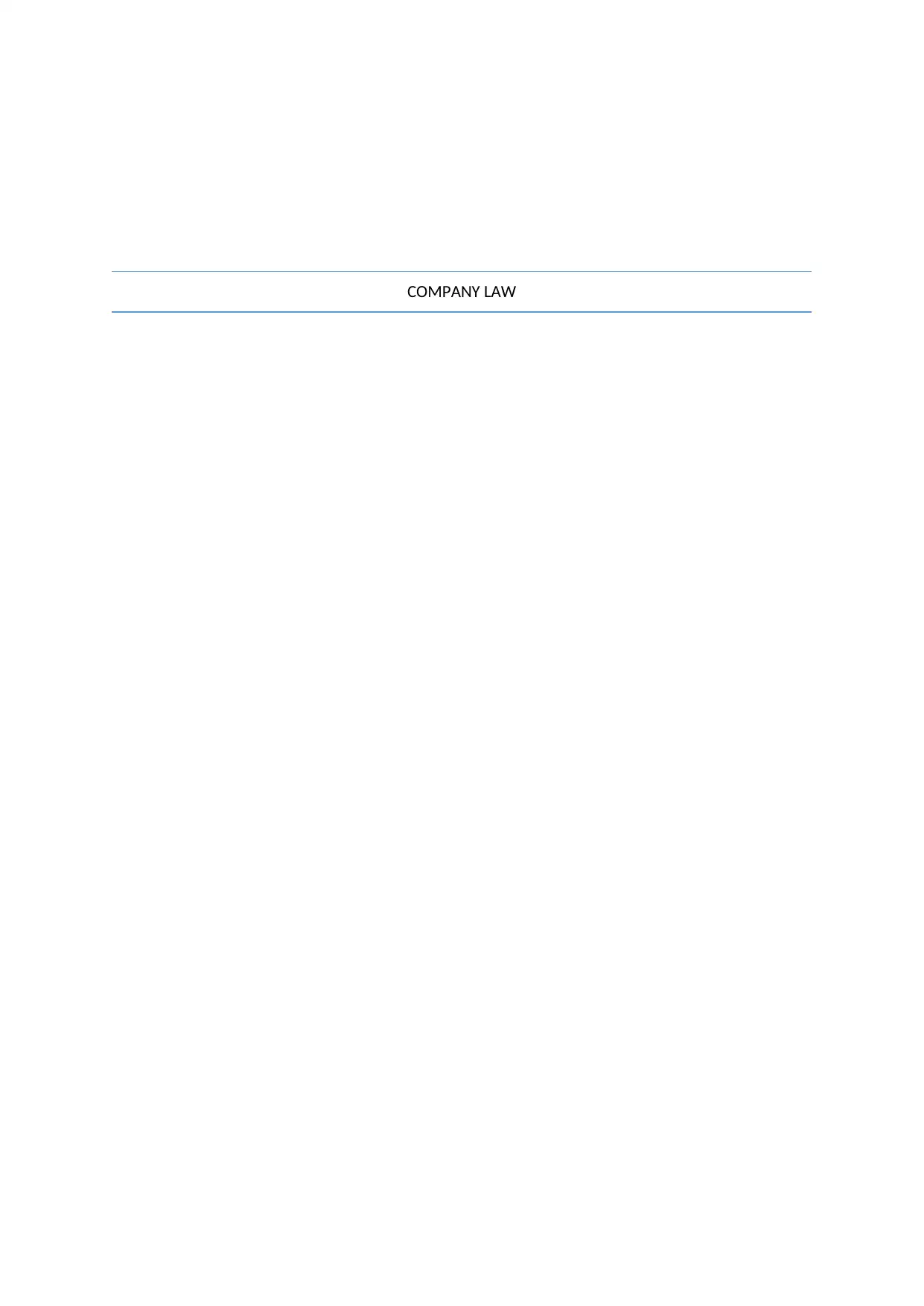
COMPANY LAW
Paraphrase This Document
Need a fresh take? Get an instant paraphrase of this document with our AI Paraphraser
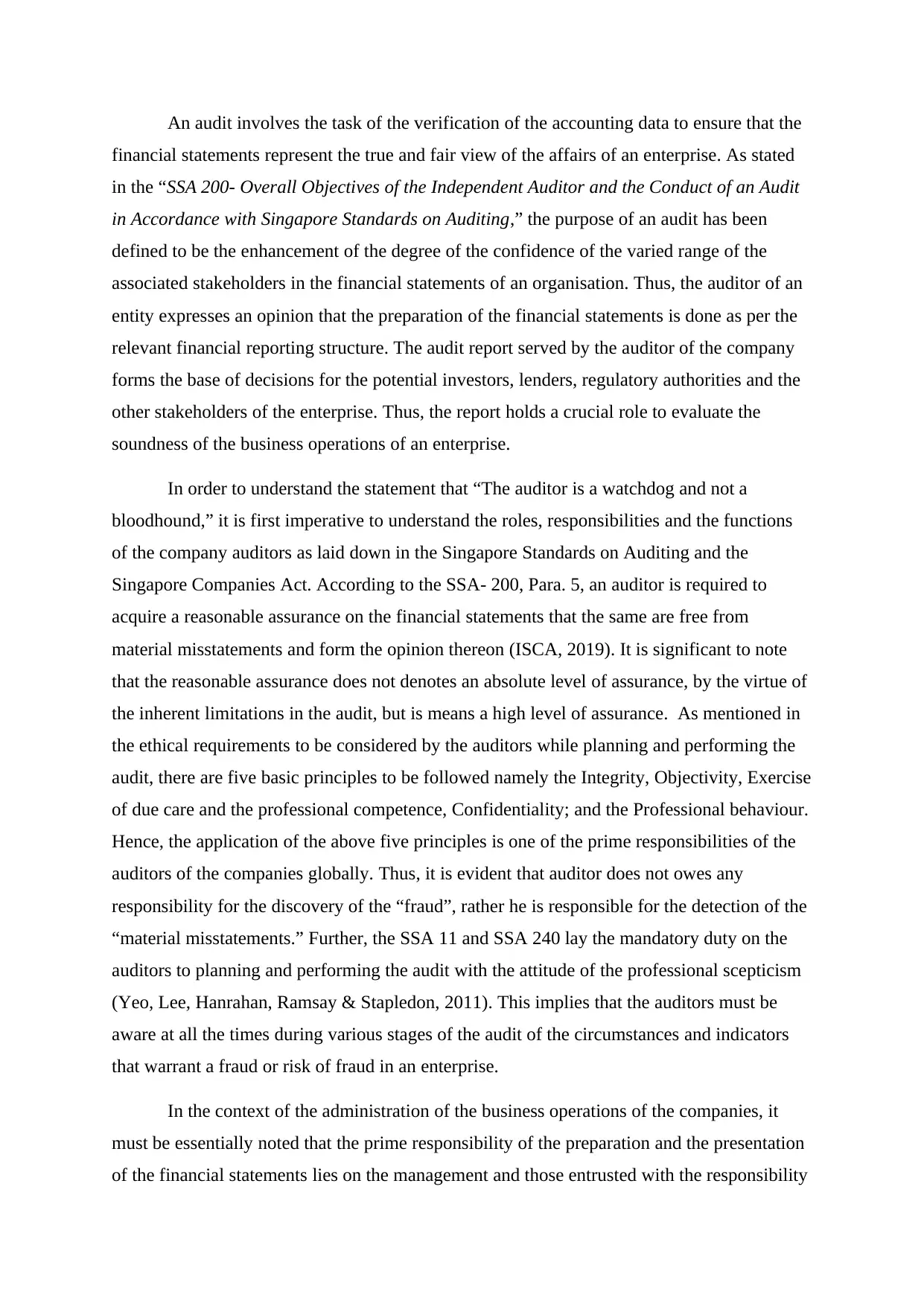
An audit involves the task of the verification of the accounting data to ensure that the
financial statements represent the true and fair view of the affairs of an enterprise. As stated
in the “SSA 200- Overall Objectives of the Independent Auditor and the Conduct of an Audit
in Accordance with Singapore Standards on Auditing,” the purpose of an audit has been
defined to be the enhancement of the degree of the confidence of the varied range of the
associated stakeholders in the financial statements of an organisation. Thus, the auditor of an
entity expresses an opinion that the preparation of the financial statements is done as per the
relevant financial reporting structure. The audit report served by the auditor of the company
forms the base of decisions for the potential investors, lenders, regulatory authorities and the
other stakeholders of the enterprise. Thus, the report holds a crucial role to evaluate the
soundness of the business operations of an enterprise.
In order to understand the statement that “The auditor is a watchdog and not a
bloodhound,” it is first imperative to understand the roles, responsibilities and the functions
of the company auditors as laid down in the Singapore Standards on Auditing and the
Singapore Companies Act. According to the SSA- 200, Para. 5, an auditor is required to
acquire a reasonable assurance on the financial statements that the same are free from
material misstatements and form the opinion thereon (ISCA, 2019). It is significant to note
that the reasonable assurance does not denotes an absolute level of assurance, by the virtue of
the inherent limitations in the audit, but is means a high level of assurance. As mentioned in
the ethical requirements to be considered by the auditors while planning and performing the
audit, there are five basic principles to be followed namely the Integrity, Objectivity, Exercise
of due care and the professional competence, Confidentiality; and the Professional behaviour.
Hence, the application of the above five principles is one of the prime responsibilities of the
auditors of the companies globally. Thus, it is evident that auditor does not owes any
responsibility for the discovery of the “fraud”, rather he is responsible for the detection of the
“material misstatements.” Further, the SSA 11 and SSA 240 lay the mandatory duty on the
auditors to planning and performing the audit with the attitude of the professional scepticism
(Yeo, Lee, Hanrahan, Ramsay & Stapledon, 2011). This implies that the auditors must be
aware at all the times during various stages of the audit of the circumstances and indicators
that warrant a fraud or risk of fraud in an enterprise.
In the context of the administration of the business operations of the companies, it
must be essentially noted that the prime responsibility of the preparation and the presentation
of the financial statements lies on the management and those entrusted with the responsibility
financial statements represent the true and fair view of the affairs of an enterprise. As stated
in the “SSA 200- Overall Objectives of the Independent Auditor and the Conduct of an Audit
in Accordance with Singapore Standards on Auditing,” the purpose of an audit has been
defined to be the enhancement of the degree of the confidence of the varied range of the
associated stakeholders in the financial statements of an organisation. Thus, the auditor of an
entity expresses an opinion that the preparation of the financial statements is done as per the
relevant financial reporting structure. The audit report served by the auditor of the company
forms the base of decisions for the potential investors, lenders, regulatory authorities and the
other stakeholders of the enterprise. Thus, the report holds a crucial role to evaluate the
soundness of the business operations of an enterprise.
In order to understand the statement that “The auditor is a watchdog and not a
bloodhound,” it is first imperative to understand the roles, responsibilities and the functions
of the company auditors as laid down in the Singapore Standards on Auditing and the
Singapore Companies Act. According to the SSA- 200, Para. 5, an auditor is required to
acquire a reasonable assurance on the financial statements that the same are free from
material misstatements and form the opinion thereon (ISCA, 2019). It is significant to note
that the reasonable assurance does not denotes an absolute level of assurance, by the virtue of
the inherent limitations in the audit, but is means a high level of assurance. As mentioned in
the ethical requirements to be considered by the auditors while planning and performing the
audit, there are five basic principles to be followed namely the Integrity, Objectivity, Exercise
of due care and the professional competence, Confidentiality; and the Professional behaviour.
Hence, the application of the above five principles is one of the prime responsibilities of the
auditors of the companies globally. Thus, it is evident that auditor does not owes any
responsibility for the discovery of the “fraud”, rather he is responsible for the detection of the
“material misstatements.” Further, the SSA 11 and SSA 240 lay the mandatory duty on the
auditors to planning and performing the audit with the attitude of the professional scepticism
(Yeo, Lee, Hanrahan, Ramsay & Stapledon, 2011). This implies that the auditors must be
aware at all the times during various stages of the audit of the circumstances and indicators
that warrant a fraud or risk of fraud in an enterprise.
In the context of the administration of the business operations of the companies, it
must be essentially noted that the prime responsibility of the preparation and the presentation
of the financial statements lies on the management and those entrusted with the responsibility
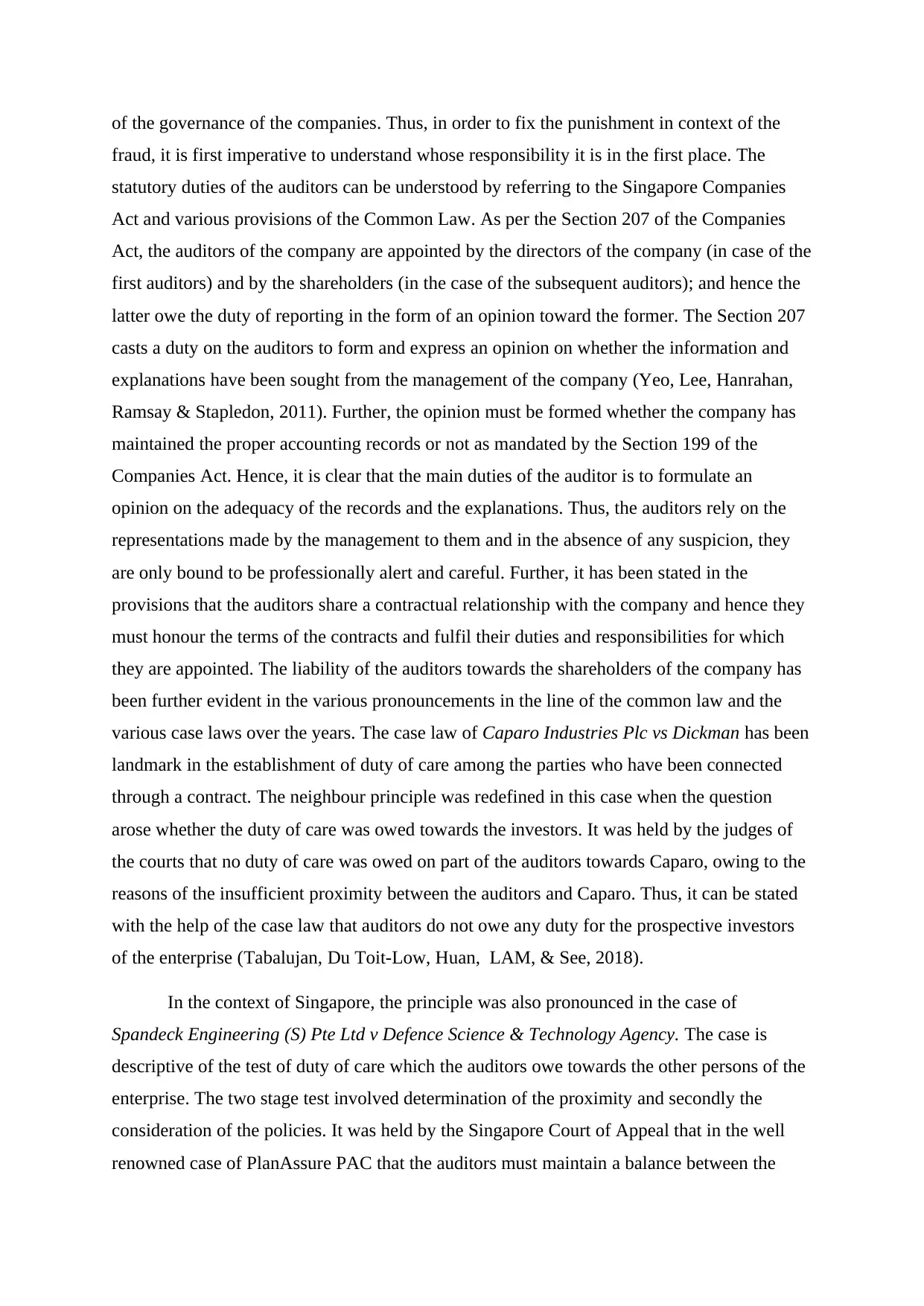
of the governance of the companies. Thus, in order to fix the punishment in context of the
fraud, it is first imperative to understand whose responsibility it is in the first place. The
statutory duties of the auditors can be understood by referring to the Singapore Companies
Act and various provisions of the Common Law. As per the Section 207 of the Companies
Act, the auditors of the company are appointed by the directors of the company (in case of the
first auditors) and by the shareholders (in the case of the subsequent auditors); and hence the
latter owe the duty of reporting in the form of an opinion toward the former. The Section 207
casts a duty on the auditors to form and express an opinion on whether the information and
explanations have been sought from the management of the company (Yeo, Lee, Hanrahan,
Ramsay & Stapledon, 2011). Further, the opinion must be formed whether the company has
maintained the proper accounting records or not as mandated by the Section 199 of the
Companies Act. Hence, it is clear that the main duties of the auditor is to formulate an
opinion on the adequacy of the records and the explanations. Thus, the auditors rely on the
representations made by the management to them and in the absence of any suspicion, they
are only bound to be professionally alert and careful. Further, it has been stated in the
provisions that the auditors share a contractual relationship with the company and hence they
must honour the terms of the contracts and fulfil their duties and responsibilities for which
they are appointed. The liability of the auditors towards the shareholders of the company has
been further evident in the various pronouncements in the line of the common law and the
various case laws over the years. The case law of Caparo Industries Plc vs Dickman has been
landmark in the establishment of duty of care among the parties who have been connected
through a contract. The neighbour principle was redefined in this case when the question
arose whether the duty of care was owed towards the investors. It was held by the judges of
the courts that no duty of care was owed on part of the auditors towards Caparo, owing to the
reasons of the insufficient proximity between the auditors and Caparo. Thus, it can be stated
with the help of the case law that auditors do not owe any duty for the prospective investors
of the enterprise (Tabalujan, Du Toit-Low, Huan, LAM, & See, 2018).
In the context of Singapore, the principle was also pronounced in the case of
Spandeck Engineering (S) Pte Ltd v Defence Science & Technology Agency. The case is
descriptive of the test of duty of care which the auditors owe towards the other persons of the
enterprise. The two stage test involved determination of the proximity and secondly the
consideration of the policies. It was held by the Singapore Court of Appeal that in the well
renowned case of PlanAssure PAC that the auditors must maintain a balance between the
fraud, it is first imperative to understand whose responsibility it is in the first place. The
statutory duties of the auditors can be understood by referring to the Singapore Companies
Act and various provisions of the Common Law. As per the Section 207 of the Companies
Act, the auditors of the company are appointed by the directors of the company (in case of the
first auditors) and by the shareholders (in the case of the subsequent auditors); and hence the
latter owe the duty of reporting in the form of an opinion toward the former. The Section 207
casts a duty on the auditors to form and express an opinion on whether the information and
explanations have been sought from the management of the company (Yeo, Lee, Hanrahan,
Ramsay & Stapledon, 2011). Further, the opinion must be formed whether the company has
maintained the proper accounting records or not as mandated by the Section 199 of the
Companies Act. Hence, it is clear that the main duties of the auditor is to formulate an
opinion on the adequacy of the records and the explanations. Thus, the auditors rely on the
representations made by the management to them and in the absence of any suspicion, they
are only bound to be professionally alert and careful. Further, it has been stated in the
provisions that the auditors share a contractual relationship with the company and hence they
must honour the terms of the contracts and fulfil their duties and responsibilities for which
they are appointed. The liability of the auditors towards the shareholders of the company has
been further evident in the various pronouncements in the line of the common law and the
various case laws over the years. The case law of Caparo Industries Plc vs Dickman has been
landmark in the establishment of duty of care among the parties who have been connected
through a contract. The neighbour principle was redefined in this case when the question
arose whether the duty of care was owed towards the investors. It was held by the judges of
the courts that no duty of care was owed on part of the auditors towards Caparo, owing to the
reasons of the insufficient proximity between the auditors and Caparo. Thus, it can be stated
with the help of the case law that auditors do not owe any duty for the prospective investors
of the enterprise (Tabalujan, Du Toit-Low, Huan, LAM, & See, 2018).
In the context of Singapore, the principle was also pronounced in the case of
Spandeck Engineering (S) Pte Ltd v Defence Science & Technology Agency. The case is
descriptive of the test of duty of care which the auditors owe towards the other persons of the
enterprise. The two stage test involved determination of the proximity and secondly the
consideration of the policies. It was held by the Singapore Court of Appeal that in the well
renowned case of PlanAssure PAC that the auditors must maintain a balance between the
⊘ This is a preview!⊘
Do you want full access?
Subscribe today to unlock all pages.

Trusted by 1+ million students worldwide
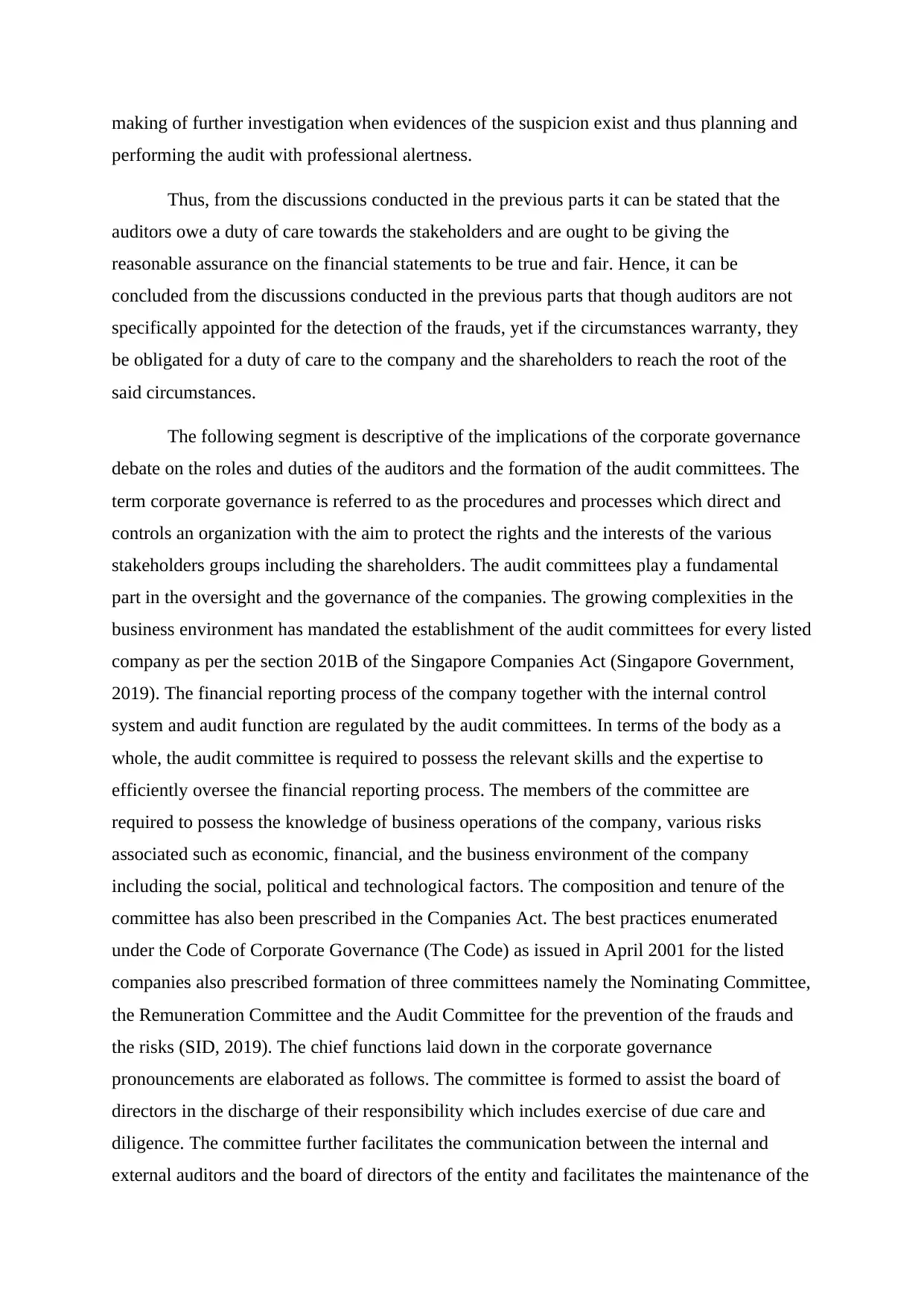
making of further investigation when evidences of the suspicion exist and thus planning and
performing the audit with professional alertness.
Thus, from the discussions conducted in the previous parts it can be stated that the
auditors owe a duty of care towards the stakeholders and are ought to be giving the
reasonable assurance on the financial statements to be true and fair. Hence, it can be
concluded from the discussions conducted in the previous parts that though auditors are not
specifically appointed for the detection of the frauds, yet if the circumstances warranty, they
be obligated for a duty of care to the company and the shareholders to reach the root of the
said circumstances.
The following segment is descriptive of the implications of the corporate governance
debate on the roles and duties of the auditors and the formation of the audit committees. The
term corporate governance is referred to as the procedures and processes which direct and
controls an organization with the aim to protect the rights and the interests of the various
stakeholders groups including the shareholders. The audit committees play a fundamental
part in the oversight and the governance of the companies. The growing complexities in the
business environment has mandated the establishment of the audit committees for every listed
company as per the section 201B of the Singapore Companies Act (Singapore Government,
2019). The financial reporting process of the company together with the internal control
system and audit function are regulated by the audit committees. In terms of the body as a
whole, the audit committee is required to possess the relevant skills and the expertise to
efficiently oversee the financial reporting process. The members of the committee are
required to possess the knowledge of business operations of the company, various risks
associated such as economic, financial, and the business environment of the company
including the social, political and technological factors. The composition and tenure of the
committee has also been prescribed in the Companies Act. The best practices enumerated
under the Code of Corporate Governance (The Code) as issued in April 2001 for the listed
companies also prescribed formation of three committees namely the Nominating Committee,
the Remuneration Committee and the Audit Committee for the prevention of the frauds and
the risks (SID, 2019). The chief functions laid down in the corporate governance
pronouncements are elaborated as follows. The committee is formed to assist the board of
directors in the discharge of their responsibility which includes exercise of due care and
diligence. The committee further facilitates the communication between the internal and
external auditors and the board of directors of the entity and facilitates the maintenance of the
performing the audit with professional alertness.
Thus, from the discussions conducted in the previous parts it can be stated that the
auditors owe a duty of care towards the stakeholders and are ought to be giving the
reasonable assurance on the financial statements to be true and fair. Hence, it can be
concluded from the discussions conducted in the previous parts that though auditors are not
specifically appointed for the detection of the frauds, yet if the circumstances warranty, they
be obligated for a duty of care to the company and the shareholders to reach the root of the
said circumstances.
The following segment is descriptive of the implications of the corporate governance
debate on the roles and duties of the auditors and the formation of the audit committees. The
term corporate governance is referred to as the procedures and processes which direct and
controls an organization with the aim to protect the rights and the interests of the various
stakeholders groups including the shareholders. The audit committees play a fundamental
part in the oversight and the governance of the companies. The growing complexities in the
business environment has mandated the establishment of the audit committees for every listed
company as per the section 201B of the Singapore Companies Act (Singapore Government,
2019). The financial reporting process of the company together with the internal control
system and audit function are regulated by the audit committees. In terms of the body as a
whole, the audit committee is required to possess the relevant skills and the expertise to
efficiently oversee the financial reporting process. The members of the committee are
required to possess the knowledge of business operations of the company, various risks
associated such as economic, financial, and the business environment of the company
including the social, political and technological factors. The composition and tenure of the
committee has also been prescribed in the Companies Act. The best practices enumerated
under the Code of Corporate Governance (The Code) as issued in April 2001 for the listed
companies also prescribed formation of three committees namely the Nominating Committee,
the Remuneration Committee and the Audit Committee for the prevention of the frauds and
the risks (SID, 2019). The chief functions laid down in the corporate governance
pronouncements are elaborated as follows. The committee is formed to assist the board of
directors in the discharge of their responsibility which includes exercise of due care and
diligence. The committee further facilitates the communication between the internal and
external auditors and the board of directors of the entity and facilitates the maintenance of the
Paraphrase This Document
Need a fresh take? Get an instant paraphrase of this document with our AI Paraphraser
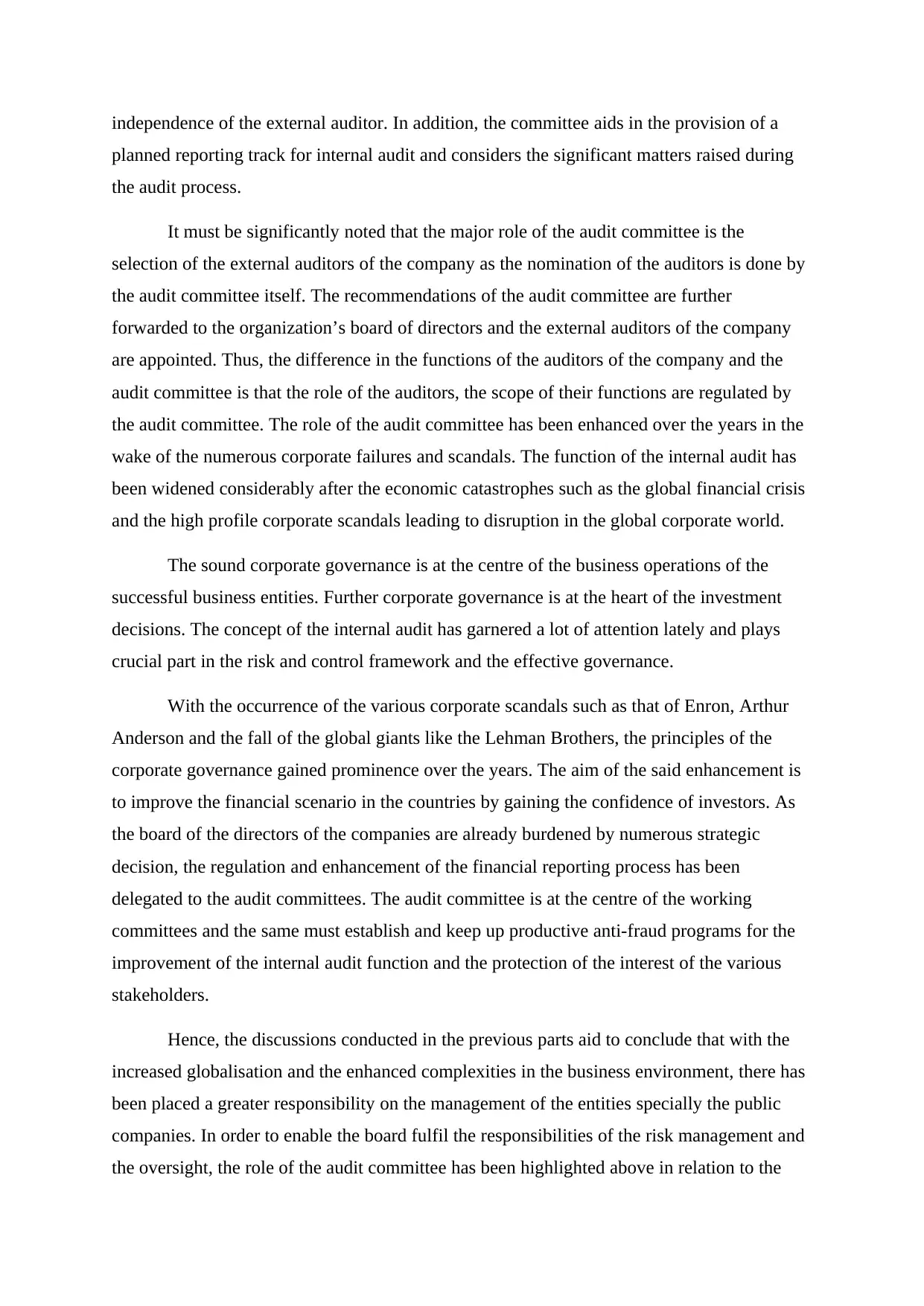
independence of the external auditor. In addition, the committee aids in the provision of a
planned reporting track for internal audit and considers the significant matters raised during
the audit process.
It must be significantly noted that the major role of the audit committee is the
selection of the external auditors of the company as the nomination of the auditors is done by
the audit committee itself. The recommendations of the audit committee are further
forwarded to the organization’s board of directors and the external auditors of the company
are appointed. Thus, the difference in the functions of the auditors of the company and the
audit committee is that the role of the auditors, the scope of their functions are regulated by
the audit committee. The role of the audit committee has been enhanced over the years in the
wake of the numerous corporate failures and scandals. The function of the internal audit has
been widened considerably after the economic catastrophes such as the global financial crisis
and the high profile corporate scandals leading to disruption in the global corporate world.
The sound corporate governance is at the centre of the business operations of the
successful business entities. Further corporate governance is at the heart of the investment
decisions. The concept of the internal audit has garnered a lot of attention lately and plays
crucial part in the risk and control framework and the effective governance.
With the occurrence of the various corporate scandals such as that of Enron, Arthur
Anderson and the fall of the global giants like the Lehman Brothers, the principles of the
corporate governance gained prominence over the years. The aim of the said enhancement is
to improve the financial scenario in the countries by gaining the confidence of investors. As
the board of the directors of the companies are already burdened by numerous strategic
decision, the regulation and enhancement of the financial reporting process has been
delegated to the audit committees. The audit committee is at the centre of the working
committees and the same must establish and keep up productive anti-fraud programs for the
improvement of the internal audit function and the protection of the interest of the various
stakeholders.
Hence, the discussions conducted in the previous parts aid to conclude that with the
increased globalisation and the enhanced complexities in the business environment, there has
been placed a greater responsibility on the management of the entities specially the public
companies. In order to enable the board fulfil the responsibilities of the risk management and
the oversight, the role of the audit committee has been highlighted above in relation to the
planned reporting track for internal audit and considers the significant matters raised during
the audit process.
It must be significantly noted that the major role of the audit committee is the
selection of the external auditors of the company as the nomination of the auditors is done by
the audit committee itself. The recommendations of the audit committee are further
forwarded to the organization’s board of directors and the external auditors of the company
are appointed. Thus, the difference in the functions of the auditors of the company and the
audit committee is that the role of the auditors, the scope of their functions are regulated by
the audit committee. The role of the audit committee has been enhanced over the years in the
wake of the numerous corporate failures and scandals. The function of the internal audit has
been widened considerably after the economic catastrophes such as the global financial crisis
and the high profile corporate scandals leading to disruption in the global corporate world.
The sound corporate governance is at the centre of the business operations of the
successful business entities. Further corporate governance is at the heart of the investment
decisions. The concept of the internal audit has garnered a lot of attention lately and plays
crucial part in the risk and control framework and the effective governance.
With the occurrence of the various corporate scandals such as that of Enron, Arthur
Anderson and the fall of the global giants like the Lehman Brothers, the principles of the
corporate governance gained prominence over the years. The aim of the said enhancement is
to improve the financial scenario in the countries by gaining the confidence of investors. As
the board of the directors of the companies are already burdened by numerous strategic
decision, the regulation and enhancement of the financial reporting process has been
delegated to the audit committees. The audit committee is at the centre of the working
committees and the same must establish and keep up productive anti-fraud programs for the
improvement of the internal audit function and the protection of the interest of the various
stakeholders.
Hence, the discussions conducted in the previous parts aid to conclude that with the
increased globalisation and the enhanced complexities in the business environment, there has
been placed a greater responsibility on the management of the entities specially the public
companies. In order to enable the board fulfil the responsibilities of the risk management and
the oversight, the role of the audit committee has been highlighted above in relation to the
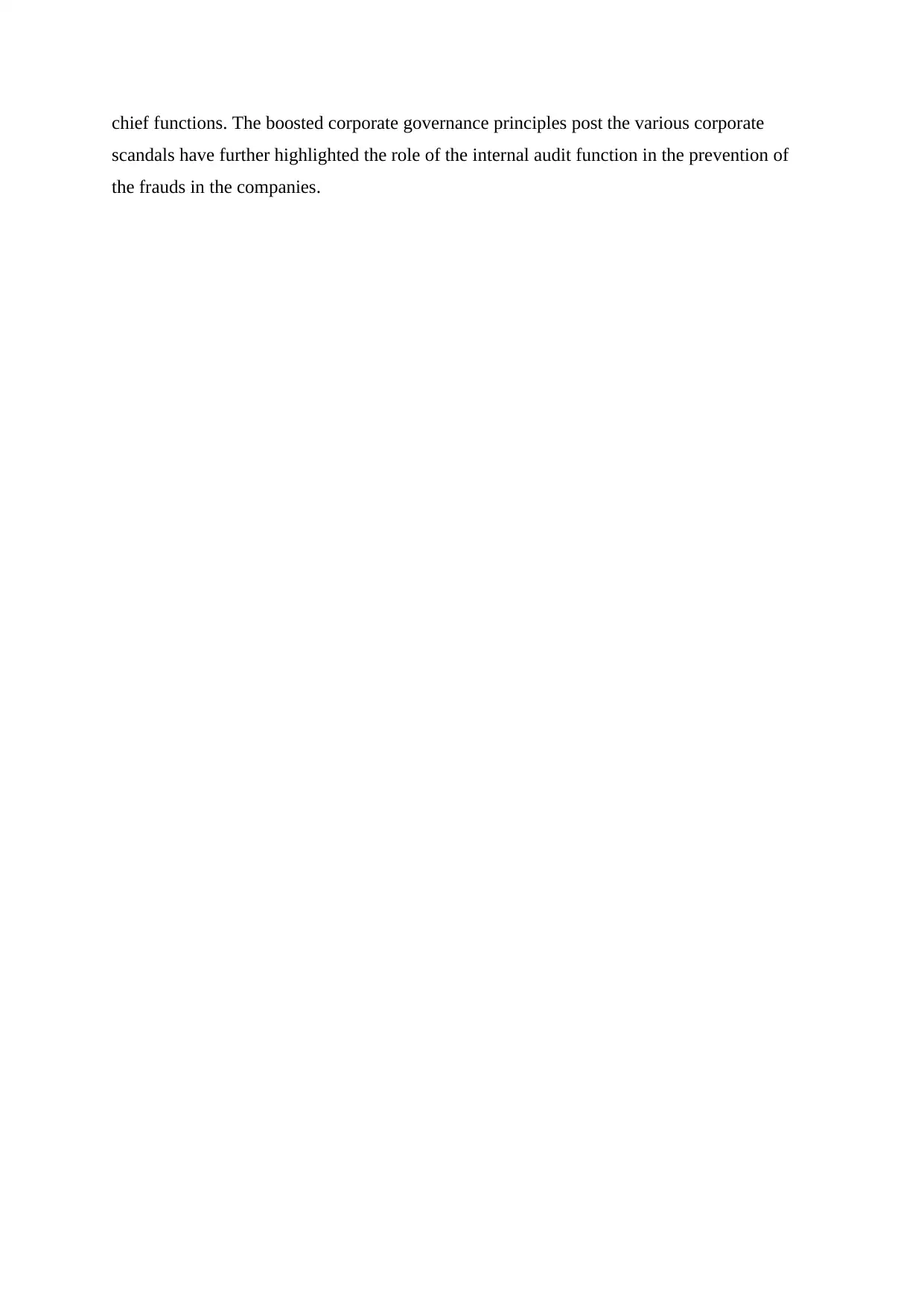
chief functions. The boosted corporate governance principles post the various corporate
scandals have further highlighted the role of the internal audit function in the prevention of
the frauds in the companies.
scandals have further highlighted the role of the internal audit function in the prevention of
the frauds in the companies.
⊘ This is a preview!⊘
Do you want full access?
Subscribe today to unlock all pages.

Trusted by 1+ million students worldwide
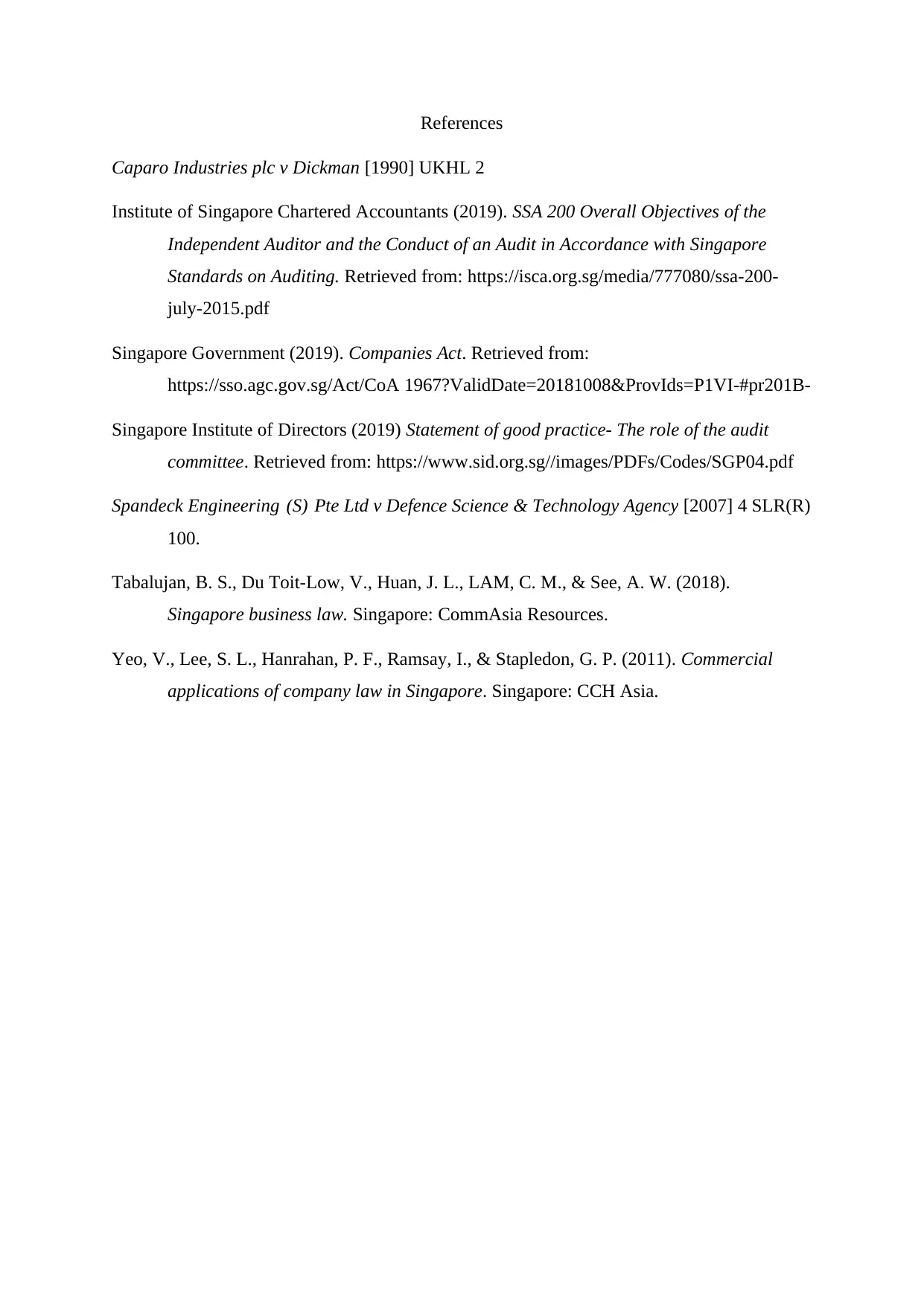
References
Caparo Industries plc v Dickman [1990] UKHL 2
Institute of Singapore Chartered Accountants (2019). SSA 200 Overall Objectives of the
Independent Auditor and the Conduct of an Audit in Accordance with Singapore
Standards on Auditing. Retrieved from: https://isca.org.sg/media/777080/ssa-200-
july-2015.pdf
Singapore Government (2019). Companies Act. Retrieved from:
https://sso.agc.gov.sg/Act/CoA 1967?ValidDate=20181008&ProvIds=P1VI-#pr201B-
Singapore Institute of Directors (2019) Statement of good practice- The role of the audit
committee. Retrieved from: https://www.sid.org.sg//images/PDFs/Codes/SGP04.pdf
Spandeck Engineering (S) Pte Ltd v Defence Science & Technology Agency [2007] 4 SLR(R)
100.
Tabalujan, B. S., Du Toit-Low, V., Huan, J. L., LAM, C. M., & See, A. W. (2018).
Singapore business law. Singapore: CommAsia Resources.
Yeo, V., Lee, S. L., Hanrahan, P. F., Ramsay, I., & Stapledon, G. P. (2011). Commercial
applications of company law in Singapore. Singapore: CCH Asia.
Caparo Industries plc v Dickman [1990] UKHL 2
Institute of Singapore Chartered Accountants (2019). SSA 200 Overall Objectives of the
Independent Auditor and the Conduct of an Audit in Accordance with Singapore
Standards on Auditing. Retrieved from: https://isca.org.sg/media/777080/ssa-200-
july-2015.pdf
Singapore Government (2019). Companies Act. Retrieved from:
https://sso.agc.gov.sg/Act/CoA 1967?ValidDate=20181008&ProvIds=P1VI-#pr201B-
Singapore Institute of Directors (2019) Statement of good practice- The role of the audit
committee. Retrieved from: https://www.sid.org.sg//images/PDFs/Codes/SGP04.pdf
Spandeck Engineering (S) Pte Ltd v Defence Science & Technology Agency [2007] 4 SLR(R)
100.
Tabalujan, B. S., Du Toit-Low, V., Huan, J. L., LAM, C. M., & See, A. W. (2018).
Singapore business law. Singapore: CommAsia Resources.
Yeo, V., Lee, S. L., Hanrahan, P. F., Ramsay, I., & Stapledon, G. P. (2011). Commercial
applications of company law in Singapore. Singapore: CCH Asia.
1 out of 7
Related Documents
Your All-in-One AI-Powered Toolkit for Academic Success.
+13062052269
info@desklib.com
Available 24*7 on WhatsApp / Email
![[object Object]](/_next/static/media/star-bottom.7253800d.svg)
Unlock your academic potential
Copyright © 2020–2026 A2Z Services. All Rights Reserved. Developed and managed by ZUCOL.





